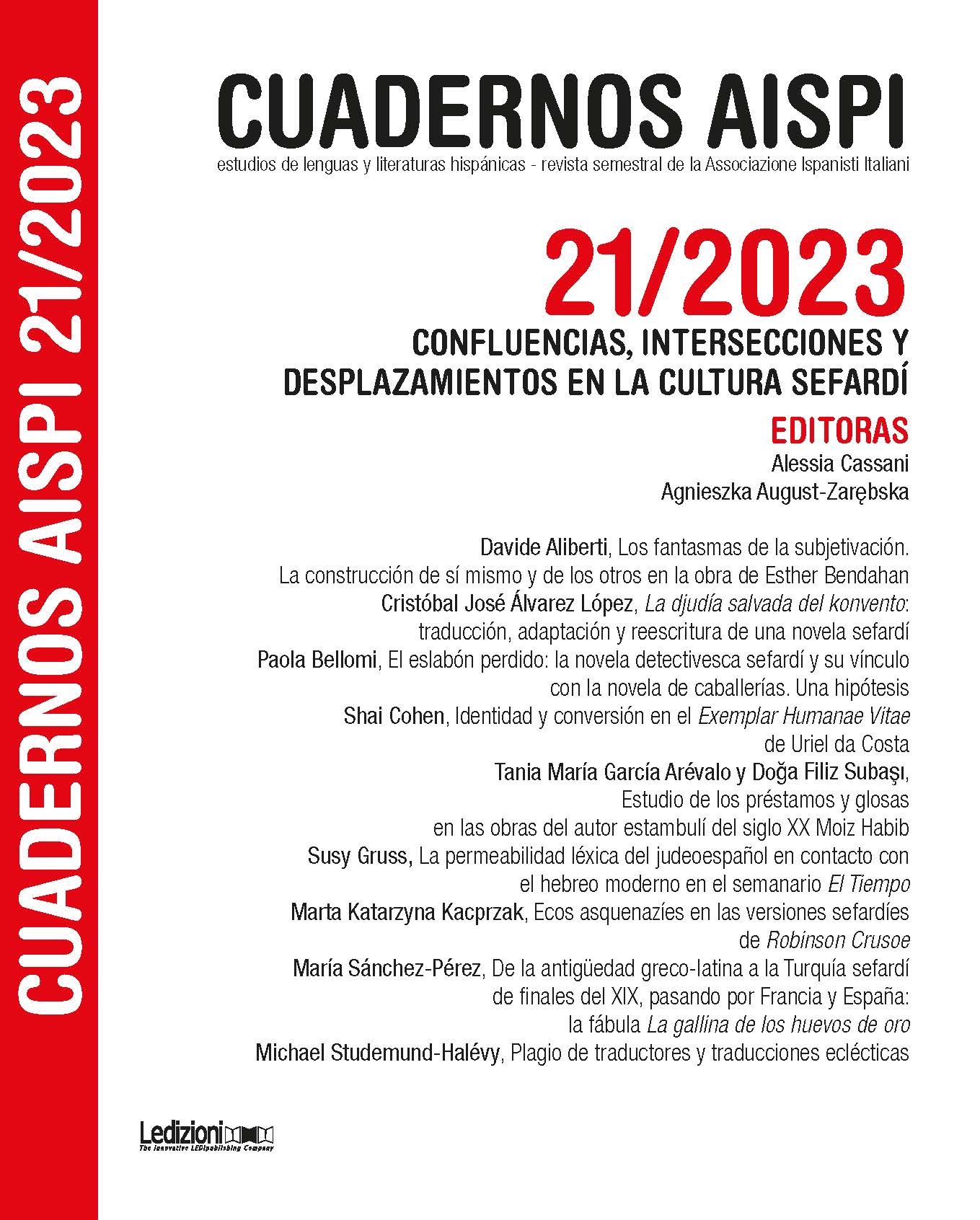The missing link: the Sephardic detective novel and its connection with the chivalric novel. A hypothesis
DOI:
https://doi.org/10.14672/1.2023.2177Keywords:
Sephardic Novel, detective novel, chivalric novel, reception theory, PseudotranslationAbstract
The detective novel belongs to the so-called “adopted genres”, that is, it represents a sample of “foreign” literature that penetrated and settled in the Sephardic communities of the East at the beginning of the 20th century. My purpose is to investigate this production in its context of creation and dissemination, with the aim of offering new data on a narrative that offered models far removed from the traditional ones and that was also inserted in the majority Turkish culture, which at that time was living some profound changes. The hypothesis is that Sephardic best-sellers looked as much towards the new and successful Turkish detective genre as towards the old tradition of the Spanish chivalric novel.
Downloads
References
Alpert, Michael (2010), “The Ladino Novel”, European Judaism: A Journal for the New Europe, 43/2: 52-62.
Barquín, Amelia (1999), “La aventura de la novela sefardí”, Neue Romania, 22: 9-24.
Boer, Harm den (1996), La literatura sefardí de Amsterdam, Alcalá de Henares, Instituto Internacional de Estudios Sefardíes y Andalusíes.
Bombaci, Alessio (1956), Storia della letteratura turca: dall’antico impero di Mongolia all’odierna Turchia, Milano, Nuova Accademia.
Borovaya, Olga (2012), Modern Ladino Culture: Press, Belles Lettres, and Theater in the Late Ottoman Empire, Bloomington, Indiana University Press.
Demir-Atay, Hivren (2014), “Edgar Allan Poe in Turkish: Translations in Three Alphabets”, Translated Poe, eds. Margarida Vale de Gato et al. Bethlehem, Lehigh University Press: 131-40.
Demirkol, Neslihan (2019), “Ottoman Print Culture”, Lingua Franca. SHARP - The Society for the History of Authorship, Reading and Publishing, [30/06/2022] <https://doi.org/10.5167/uzh-172442>
Díaz Esteban, Fernando (2008), “Literatura de los sefardíes occidentales”, Sefardíes: literatura y lengua de una nación dispersa, eds. Iacob M. Hassán; Ricardo Izquierdo Benito. Cuenca, Ediciones de la Universidad de Castilla-La Mancha: 593-610.
Díaz-Mas, Paloma, (2015), “Una de detectives en judeoespañol”, Raíces. Revista Judía de Cultura, 102 (primavera): 53-55.
Díaz-Mas, Paloma; Martín Ortega, Elisa (2016), “Lecturas para mujeres y mujeres escritoras en la cultura sefardí”, Mujeres sefardíes lectoras y escritoras, siglos XIX-XXI, eds.
Paloma Díaz-Mas; Elisa Martín Ortega. Madrid, Iberoamericana: 9-54.
Ergut, Ferdan (2002), “Policing the Poor in the Late Ottoman Empire”, Middle Eastern Studies, 38/2: 149-64.
Esposito, Raffaele (2016), La nascita del teatro ebraico, Torino, Accademia University Press.
García Arévalo, Tanía María; Subasi, Doga Filiz (2021), “Un Bezes desconocido y su obra: El detektive kriminal (Salónica, 1935)”, Meldar: Revista Internacional de Estudios sefardíes, 2: 37–57.
Harris-Hernandez, Damian (1997), Kara Hüseyin: An Ottoman Detective Series: The Shadow Band, s.l., Knickerbocker Publishing Guild.
Harris-Hernandez, Damian (1997), Kara Hüseyin: An Ottoman Detective Series: Bloodbath in the Hamam, s.l., Knickerbocker Publishing Guild.
Jauss, Hans Robert (1992), Experiencia estética y hermenéutica, Madrid, Taurus.
Lacassin, Francis (1993), “La società Eclair e la letteratura popolare in Europa dal 1908 al 1909”, Griffithiana, 47: 60-87.
Lattes, Andrea Y. (1997), “L’opera letteraria di Rabbi Moshè Zacuto”, La Rassegna Mensile di Israel, 63/2: 1-26.
Maslinskaya, Svetlana (2020), “Nat Pinkerton: A Missing Genre in Russian Children’s Literature”, Bookbird: A Journal of International Children’s Literature, 58/2: 25-33.
Neri, Stefano (2008), “Cuadro de la difusión europea del ciclo del Amadís de Gaula (siglos XVI-XVII)”, Amadís de Gaula: quinientos años después, eds. José Manuel Lucía Megías; María Carmen Marín Pina. Alcalá de Henares, Centro de Estudios Cervantinos: 565-92.
Nider, Valentina (2010), “José Penso e l’accademia sefardita ‘de los Sitibundos’ di Livorno nella diffusione di un genere oratorio fra Italia e Spagna: traduzione e imitazione nelle ‘Ideas possibles’ (1692)”, Studi Secenteschi, 51: 153-96.
Romero, Elena (1992), La creación literaria en lengua sefardí, Madrid, MAPFRE.
Romero, Elena (1993), “Nuevos aspectos de la narrativa judeoespañola”, Proyección histórica de España en sus tres culturas, Castilla y León, América y el Mediterráneo, ed. Eufemio Lorenzo Sanz. Valladolid, Junta de Castilla y León, vol. 3: 177-94.
Romero, Elena (2008), “Historia y literatura”, Sefardíes: literatura y lengua de una nación dispersa, eds. Iacob M. Hassán; Ricardo Izquierdo Benito. Cuenca, Ediciones de la Universidad de Castilla-La Mancha: 155-92.
Scolnik, Julie (2010), “The Dectective Novel in Ladino: Clues to a Little Known Genre”, European Judaism, 43/2: 126-33.
Scolnik, Julie (2011), “La novela detectivesca en lengua sefardí: pistas y pesquisas”, Estudios sefardíes dedicados a la memoria de Iacob M. Hassán, eds. Elena Romero Castelló; Aitor García Moreno. Madrid, CSIC: 569-78.
Scolnik, Julie (2014), Nat Pinkerton: diez novelas policíacas en lengua sefardí, Barcelona, Tirocinio.
Simon, Rachel (2011), “The Contribution of Hebrew Printing Houses and Printers in Istanbul to Ladino Culture and Scholarship”, Judaica Librarianship, 16: 125-35.
Tahir-Gürçağlar, Şehnaz (2008), “Sherlock Holmes in the Interculture: Pseudotranslation and Anonymity in Turkish Literature”, Beyond Descriptive Translation Studies: Investigations in homage to Gideon Toury, eds. Anthony Pym; Miriam Shlesinger; Daniel Simeoni. Amsterdam, John Benjamins Publishing: 133-52.
Tekdemir, Hande (2020), “The Haunting Legacy of Edgar Allan Poe in Ottoman-Turkish Literature”, Poe studies, 53: 66–85.
Texas Jack: la terreur des indiens (1907), Paris, Adolf Eichler, [30/06/2022] <https://gallica.bnf.fr/ark:/12148/bpt6k947379g>
Trivellato, Francesca (2016), Il commercio interculturale: la diaspora sefardita, Livorno e i traffici globali in età moderna, Roma, Viella.
Wacks, David A. (2015), Double Diaspora in Sephardic Literature: Jewish Cultural Production Before and After 1492, Bloomington, Indiana University Press.
Wacks, David A. (2017), “Translation in Diaspora: Sephardic Spanish-Hebrew Translations in the Sixteenth Century”, A Comparative History of Literatures in the Iberian Peninsula, eds. César Domínguez; María José Vega. Amsterdam, John Benjamins Publishing, vol. 2: 351-63.
Yosmaoğlu, Ipek K. (2003), “Chasing the Printed Word: Press Censorship in the Ottoman Empire, 1876-1913”, Turkish Studies Association Journal, 27: 15-49.
Downloads
Published
Issue
Section
License

This work is licensed under a Creative Commons Attribution-NonCommercial-NoDerivatives 4.0 International License.
La revista está publicada bajo la licencia Creative Commons CC-BY.




